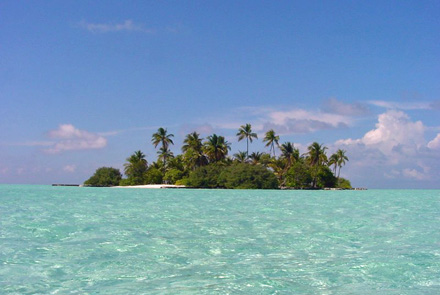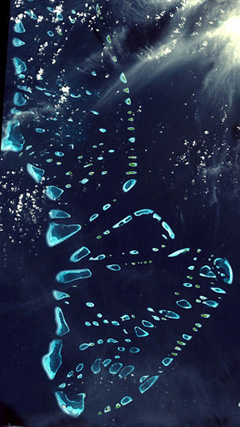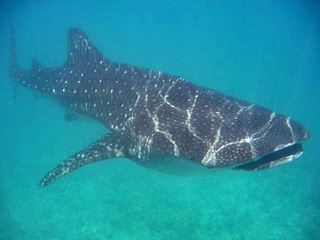Navigation
Maldives Joins United Nations (UN) Emissions Scheme in Drive to be First Carbon Neutral Country
The Maldives, one of the countries most affected by climate change, has joined a United Nations Environment Programme (UNEP) initiative which promotes the global transition to low-carbon economies and societies.
 |
| An island in the Maldives. Photo Wikipedia. |
The Maldives, one of the countries most affected by climate change, has joined a United Nations Environment Programme (UNEP) initiative which promotes the global transition to low-carbon economies and societies.
The move follows the announcement earlier this year from President Mohamed Nasheed to make the Indian Ocean archipelago the world’s first carbon neutral country in 10 years by fully switching to renewable sources of energy, such as solar panels and wind turbines, and investing in new technologies.
UNEP Executive Director Achim Steiner stressed that climate neutrality is not just a concern for developed nations. “Developing nations such as Maldives can indeed leapfrog by embracing the low-carbon development model, which will assist in greening their economies and weathering
both climatic and economic storms.”
 |
| Maldives is made up of a chain of 1192 small coral islands that are grouped into clusters of atolls. It has a total area of 298 sq km and a population of about 330,000. The capital and largest city is Male, with a population of about 80,000. Arguably the lowest-lying country in the world, the average elevation is 1 m above sea level. Waves triggered by the great tsunami of December 2004 spilled over sea walls to flood Male with sand-clouded water and then swept out just as suddenly. Residents fear this was a foreboding of disasters to come from sea-level rise due to global warming. The simulated natural color ASTER image was acquired 22 December 2002, covers an area of 50.8 x 90.4 km, and is centered near 5.3 degrees north latitude, 73.9 degrees west longitude. Image: NASA/GSFC/METI/ERSDAC/JAROS, and U.S./Japan ASTER Science Team |
Launched a year ago, the UNEP-led Climate Neutral Network (CN Net) has close to 100 participants worldwide, including several countries, cities, major international companies, UN agencies and leading non-governmental organizations (NGOs).
The Maldives – consisting of some 1,200 tropical coral islets, none of which rises more than 1.8 metres above sea level, leaving the 400,000 inhabitants at great risk of rising sea levels and storm surges – has become the seventh country to join CN Net.
The other six nations that have pledged to move towards climate neutrality and joined the CN Net are Costa Rica, Iceland, Monaco, New Zealand, Niue and Norway.
“When the most climate change vulnerable nations display leadership in addressing the cause of the problem which they had very little to contribute to, there is no excuse for others not to act,” said Mr. Steiner.
 |
| A small (4m) Whale Shark (Rhincodon typus), taken in the Maldives. Photo: Wikipedia |
Mr. Steiner urged nations around the world to commit to “protecting the planet and powering green growth by sealing an ambitious climate deal at this year's UN Climate Change Conference in Copenhagen.”
This news was provided by UN News Centre at http://www.un.org/news. May 5, 2009.
Search
Latest articles
Agriculture
- World Water Week: Healthy ecosystems essential to human health: from coronavirus to malnutrition Online session Wednesday 24 August 17:00-18:20
- World Water Week: Healthy ecosystems essential to human health: from coronavirus to malnutrition Online session Wednesday 24 August 17:00-18:20
Air Pollution
- "Water and Sanitation-Related Diseases and the Changing Environment: Challenges, Interventions, and Preventive Measures" Volume 2 Is Now Available
- Global Innovation Exchange Co-Created by Horizon International, USAID, Bill and Melinda Gates Foundation and Others
Biodiversity
- It is time for international mobilization against climate change
- World Water Week: Healthy ecosystems essential to human health: from coronavirus to malnutrition Online session Wednesday 24 August 17:00-18:20
Desertification
- World Water Week: Healthy ecosystems essential to human health: from coronavirus to malnutrition Online session Wednesday 24 August 17:00-18:20
- UN Food Systems Summit Receives Over 1,200 Ideas to Help Meet Sustainable Development Goals
Endangered Species
- Mangrove Action Project Collaborates to Restore and Preserve Mangrove Ecosystems
- Coral Research in Palau offers a “Glimmer of Hope”
Energy
- Global Innovation Exchange Co-Created by Horizon International, USAID, Bill and Melinda Gates Foundation and Others
- Wildlife Preservation in Southeast Nova Scotia
Exhibits
- Global Innovation Exchange Co-Created by Horizon International, USAID, Bill and Melinda Gates Foundation and Others
- Coral Reefs
Forests
- NASA Satellites Reveal Major Shifts in Global Freshwater Updated June 2020
- Global Innovation Exchange Co-Created by Horizon International, USAID, Bill and Melinda Gates Foundation and Others
Global Climate Change
- It is time for international mobilization against climate change
- It is time for international mobilization against climate change
Global Health
- World Water Week: Healthy ecosystems essential to human health: from coronavirus to malnutrition Online session Wednesday 24 August 17:00-18:20
- More than 400 schoolgirls, family and teachers rescued from Afghanistan by small coalition
Industry
- "Water and Sanitation-Related Diseases and the Changing Environment: Challenges, Interventions, and Preventive Measures" Volume 2 Is Now Available
- Global Innovation Exchange Co-Created by Horizon International, USAID, Bill and Melinda Gates Foundation and Others
Natural Disaster Relief
- STOP ATTACKS ON HEALTH CARE IN UKRAINE
- Global Innovation Exchange Co-Created by Horizon International, USAID, Bill and Melinda Gates Foundation and Others
News and Special Reports
- World Water Week: Healthy ecosystems essential to human health: from coronavirus to malnutrition Online session Wednesday 24 August 17:00-18:20
- STOP ATTACKS ON HEALTH CARE IN UKRAINE
Oceans, Coral Reefs
- World Water Week: Healthy ecosystems essential to human health: from coronavirus to malnutrition Online session Wednesday 24 August 17:00-18:20
- Mangrove Action Project Collaborates to Restore and Preserve Mangrove Ecosystems
Pollution
- Zakaria Ouedraogo of Burkina Faso Produces Film “Nzoue Fiyen: Water Not Drinkable”
- "Water and Sanitation-Related Diseases and the Changing Environment: Challenges, Interventions, and Preventive Measures" Volume 2 Is Now Available
Population
- "Water and Sanitation-Related Diseases and the Changing Environment: Challenges, Interventions, and Preventive Measures" Volume 2 Is Now Available
- "Water and Sanitation-Related Diseases and the Changing Environment: Challenges, Interventions, and Preventive Measures" Volume 2 Is Now Available
Public Health
- Honouring the visionary behind India’s sanitation revolution
- Honouring the visionary behind India’s sanitation revolution
Rivers
- World Water Week: Healthy ecosystems essential to human health: from coronavirus to malnutrition Online session Wednesday 24 August 17:00-18:20
- Mangrove Action Project Collaborates to Restore and Preserve Mangrove Ecosystems
Sanitation
- Honouring the visionary behind India’s sanitation revolution
- Honouring the visionary behind India’s sanitation revolution
Toxic Chemicals
- "Water and Sanitation-Related Diseases and the Changing Environment: Challenges, Interventions, and Preventive Measures" Volume 2 Is Now Available
- Actions to Prevent Polluted Drinking Water in the United States
Transportation
- "Water and Sanitation-Related Diseases and the Changing Environment: Challenges, Interventions, and Preventive Measures" Volume 2 Is Now Available
- Urbanization Provides Opportunities for Transition to a Green Economy, Says New Report
Waste Management
- Honouring the visionary behind India’s sanitation revolution
- Honouring the visionary behind India’s sanitation revolution
Water
- Honouring the visionary behind India’s sanitation revolution
- Honouring the visionary behind India’s sanitation revolution
Water and Sanitation
- Honouring the visionary behind India’s sanitation revolution
- Honouring the visionary behind India’s sanitation revolution

